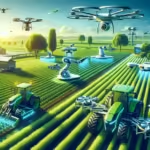Embracing the AI Revolution in Agriculture
In recent years, the integration of Artificial Intelligence (AI) into various industries has sparked transformative changes, and agriculture is no exception. The traditional methods of farming are gradually being enhanced and, in some cases, completely replaced by innovative AI technologies. This evolution is not just a trend; it is a powerful movement that promises to revolutionize the agricultural sector globally. In this post, we dive into how AI is reshaping agriculture and what it means for the future of farming.
The Role of AI in Modern Agriculture
AI in agriculture is about more than just automating processes. It is about creating systems that learn from data, adapt, and ultimately optimize both the efficiency and productivity of agricultural activities.
- Precision Agriculture: AI technologies enable farms to utilize seed, water, and fertilizers more efficiently.
- Predictive Analytics: Machine learning models analyze historical data to forecast yield, weather conditions, and pest infestations, assisting farmers in making proactive decisions.
- Robotics and Automation: Automated machinery and robots handle repetitive tasks such as planting, harvesting, and weeding, reducing human labor and minimizing error.
AI-Driven Precision Farming
Precision farming uses AI to collect real-time data on the conditions of the soil and plants. This data allows farmers to make informed decisions on where and when to plant, irrigate, and fertilize their crops.
- Sensors and IoT Devices: The use of sensors helps in monitoring soil moisture, weather patterns, and crop health.
- Satellites and Drones: These are employed for aerial surveillance and mapping, giving farmers an overview of their land with high-resolution images.
By using AI in these ways, farmers can implement more sustainable practices, minimize waste, and ensure resources are used where they are most needed.
Improving Crop Management and Yield Prediction
One of the game-changing aspects of AI in agriculture is its ability to improve crop management and predict yields. By analyzing data from past seasons, AI models can anticipate potential issues and suggest preventative measures.
- Yield Forecasting: AI can predict the volume and timing of crop yields with impressive accuracy.
- Pest and Disease Detection: Early detection systems using AI can identify pest presence and disease symptoms, allowing for timely interventions.
These insights help farmers allocate resources more effectively, reduce risks associated with crop failures, and increase overall agricultural output.
Challenges and Opportunities
While AI in agriculture holds immense potential, there are several challenges faced in its implementation. It is essential to address these to fully harness the opportunities AI brings.
Challenges
- Data Collection and Management: High-quality data is critical for AI systems to function effectively. There is a need for more comprehensive and standardized data collection practices.
- High Initial Costs: Large investments are required to adopt AI-based technologies, which can be a barrier for small-scale farmers.
- Technical Expertise: The integration of AI requires technical know-how that many traditional farmers may not possess.
Opportunities
Despite the challenges, the opportunities provided by AI in agriculture are numerous and promising.
- Increased Efficiency: AI reduces the need for physical labor and minimizes the time required for manual monitoring and maintenance.
- Resource Conservation: By optimizing resource use, AI promotes sustainable farming practices that benefit the environment.
- Scalability: AI technologies can be scaled up or down based on the farmer’s needs, making it suitable for both large and small operations.
Future of AI in Agriculture
The future of agriculture lies in intelligent systems capable of self-improving based on data-driven insights and constant learning. Here are potential advancements we can anticipate:
- Integrated Farm Management Systems: AI could lead to fully integrated systems managing all aspects of farm operations.
- Autonomous Farming Equipment: More sophisticated robots and machines that operate independently to carry out farming tasks.
- Global Data Ecosystem: A larger, interconnected database available for farmers worldwide, enabling collaborative and informed decision-making.
AI stands as an ally to the agricultural community, offering the tools necessary to overcome contemporary challenges while unlocking new potentials. As we continue to embrace AI innovations, the promise of increased productivity, profitability, and sustainability becomes more evident. The successful marriage of technology and agriculture foretells a prosperous future for one of the world’s most crucial sectors, ensuring food security for generations to come.








